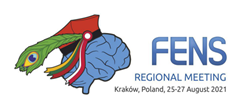
On 25 August 2021, at the Virtual FENS Regional Meeting, Anton Bespalov and Malgorzata Pietraszek (PAASP) moderated the Special Interest Event “How to maximize benefit from good research practice?”
Efforts to enhance quality of research are often seen as a burden and are perceived as activities not bringing immediate benefits for scientists. Therefore, presenters from different stakeholder groups (academia, industry, foundations, SME) highlighted benefits of implementing rigorous research practices for individual researchers as well as for the institutions.
Thomas Steckler (Janssen Pharmaceutica NV) talked about “Negatives are Positives: How to Publish Negative Data” and provided recommendations that can help scientists to publish negative (or null) results originating from rigorously designed and executed studies. Thomas also discussed the importance and benefits of publishing negative data for individual scientists, and for the entire scientific community as well as and provided practical tips that improve the odds to get negative data published.
Chantelle Ferland-Beckham (Cohen Veterans Bioscience), during the session on „Raising the Bar: The Role of Funder in Rewarding High-Quality Research”, discussed what is at stake if funders do not prioritize research rigor and how various measures can be taken to promote research rigor (and associated research integrity across the research cycle). Chantelle also discussed various initiatives developed by the Global Preclinical Data Forum, such as an award for the best publication of negative (null) results.
Valentina Vengeliene (Vilnius University) discussed benefits of research quality from the perspective of academia. Valentina provided several examples on how academic institutions as well as individual scientists in various roles (from PhD students to principal investigators) can benefit from supporting greater research rigor standards. She also emphasized the financial benefits for research institutes that result from adherence to better practices as well as suggested how to demonstrate to readers and reviewers of their publications that reported research is of high quality.
Malgorzata Pietraszek (PAASP) gave a talk about “High quality standards as a vehicle to attract collaborations“. Adherence to Good Research Practice was argued to facilitate development and maintenance of successful collaborations. Malgorzata introduced tools that were developed by the EQIPD consortium that can support collaboration by facilitating selection of research partners, providing recommendations regarding various aspects of research rigor and increasing confidence in data delivered by collaborators.
0 Comments
Leave A Comment